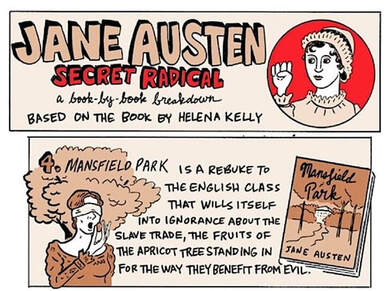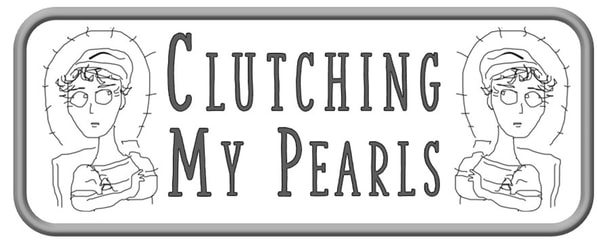| This blog explores social attitudes in Jane Austen's time, discusses her novels, reviews forgotten 18th century novels, and throws some occasional shade at the modern academy. The introductory post is here. My "six simple questions for academics" post is here. I'm currently doing a series about the significance, if any, in Austen's choice of the name "Mansfield" for her novel Mansfield Park. |
 Graphic by Nathan Gelgud (detail)
Graphic by Nathan Gelgud (detail) Well, if anti-slavery messages are why we pick up Mansfield Park, we don't we toss it aside and read Alethea Lewis instead? Because she doesn't go with subtle veiled allusions. She doesn't hold back on her opinions of slave traders and plantation owners. We meet enslaved people in The Microcosm and we travel to Jamaica. Further, Lewis's novel was published before the slave trade (but not slavery) was outlawed, while Mansfield Park was published seven years after. Thus, Fanny Price asking her uncle a question about the slave trade, years after the trade was made illegal, is not exactly a daring thing to do. Regular readers of my blog will know this is something I've banged on about quite a lot, but I had to mention it again after discovering The Microcosm. The title presumably means, "this novel is a microcosm of society today."...
And, Lewis uses the name "Mansfield" in her novel! I personally don't think she is intending a reference to Lord Mansfield, but others may disagree.
If you've been told it was risky for Austen to speak out against slavery, and that she could only hint at it by speaking of "Moor Park Apricots," if you've been told she was brave for speaking out against slavery, check out what Lewis wrote, below (see "Editorial")
 Jane Seymour in titillating Voodoo Peril, in James Bond movie "Live and Let Die" 1973
Jane Seymour in titillating Voodoo Peril, in James Bond movie "Live and Let Die" 1973 In this elaborately plotted and didactic five volume novel, heroine Harriet Montagu is relentlessly pursued by Captain Millemont, a scoundrel with an extensive East Indian fortune. I don't know if "East" is an error on the author's part, because Millemont abducts Harriet and takes her to the West Indies, that is, to his plantation in Jamaica. She is in his power for months but he does not attempt any assault on her virtue, because he is pressuring her to marry him.
Harriet eventually escapes from Millemont's plantation and runs through the jungle. This part of the story slightly resembles Charlotte Smith's The Story of Henrietta (1800), but Lewis scoops her heroine out of danger right away, without the titillating perils faced by Henrietta when she is captured by a group of runaway slaves, if you get my drift. In both these novels, the threat to the heroine's virtue was the inducement to keep turning the pages.
Harriet is rescued by Mr. and Mrs. Cumberland, two kind strangers who luckily are passing by in their carriage. They take her home and give her shelter. “Mr. Cumberland, who was a wise and good man, further proposed that Miss Montague should assume the name of his maternal family, which was Mansfield, and pass for his relation during her residence in Jamaica. The proposal was acceded to, and the servants instructed in what answers to give to any inquiries which might possibly be made relative to the lady.”
Harriet eventually returns with the Cumberlands to London, still using the name Mansfield, which proves an impediment to her reunion with the hero. He also sports a different name (because he’s a nobleman now). Eventually, however, the lovers find each other and Harriet is recognized as the rightful heiress to a substantial fortune.
If “Mansfield” was intended by Lewis as an allusion to the chief justice, she made no overt use of the fact. And believe me, subtlety is not what Alethea Lewis is about. When explaining why Harriet fails to behave as a fashionable, heartless young lady, she writes sarcastically: "AND--dire disgrace--She was a CHRISTIAN !!!" Despite pushing slavery to the background and foregrounding female peril, Lewis does not confine herself to veiled allusions against slavery. The following editorial should pique the interest of those studying the topic of representations of slavery in novels of the long 18th century:
In Volume 3 of The Microcosm, the authoress breaks away from the narrative and takes up thee/thou language as she compares the seduction of women to slave-trading, and argues that the seduction of women is worse because enslaved people are innocent and will go to heaven, but women who are seduced will go to hell along with their paramours, thus the crime of seduction sends more people to hell than slavery. Though her opinions might jar a modern reader, Lewis is unquestionably outspoken about slavery, and actually defies her readers to object to it.
The Microcosm is one of several novels by Alethea Lewis (1749--1827), who published anonymously and also under the name Eugenia de Acton. She wrote this scathing editorial against slavery before the slave trade was abolished. Mansfield Park came out after the slave trade was abolished, but some contend today that it was an act of bravery on Austen's part to include references to Moor Park apricots and Severus and Mansfield in her novel, and that she even kept the title "Mansfield" under wraps so as not to create difficulties for herself.
The Microcosm received three reviews, two mostly favourable, one unfavorable. While the critics faulted the work for being discursive, with a too-complicated plot, no-one faulted her stand against slavery.
Previous post: What was Lord Mansfield famous for? Next post: Lord Mansfield wrap up
 Moor Park, the stately home of Lord Anson Moor Park, the stately home of Lord Anson “Sir, it is a Moor Park" Why apricots as an allusion to slavery, you ask? Because Mrs. Norris and Dr. Grant argue over a Moor Park apricot tree, and the word "Moor" can signify a Moorish person, like Othello. However, in this case it doesn't. I also made an erroneous assumption that "Moor" referred to a windswept heath, but it turns out it's just a variant on the spelling of 'More." Moor Park was the name of an English estate where the apricot was cultivated, which is located on the estate of an older English mansion called the Manor of More. And why does Mrs. Norris insist that the apricot tree is a Moor Park? Because Moor Park apricots were the most popular variety. “This apricot is considered decidedly the best in cultivation; it is a very great bearer, the fruit is very fine, and deserves to be recommended before any other," says The Fruit-Grower's Instructor, 1825. And a 1998 book about Thomas Jefferson's Monticello estate says that the Moor Park is “the most popular apricot variety of the last two centuries.” (The fruits and fruit trees of Monticello. 1998.) Insisting that the word "Moor," separate from the name "Moor Park," ought to make us think of Moors, then think of Shakespeare's Othello, then think of black people, then think of slavery, then think of the apricot standing in as a symbol of complicity, is a bit of a stretch, I contend. And an entirely unnecessary one, as we have seen. |



 RSS Feed
RSS Feed